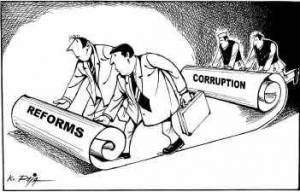Government accused of rigging anti-corruption selection commission

Civic activists have accused the Cabinet of Ministers of rigging the selection committee for members of the National Anti-Corruption Agency and demand that NGOs actively engaged in fighting corruption be included in the process.
Despite the very serious allegations from authoritative NGOs, the formal beginning of the selection process was announced on June 11, “in connection with the confirmation of the makeup of the selection commission”. The said commission was due to meet for the first time on Thursday afternoon, and candidates for the National Anti-Corruption Agency have been given 15 days to submit their documents.
The protest has been expressed by, among others, Transparency International in Ukraine and the Rehabilitation Package of Reform [RPR]. They are crying foul over the selection on May 17 of representatives of organizations with no experience of fighting corruption. At a briefing on Wednesday, MP and former investigative journalist Serhiy Leshchenko asserted that four of the members chosen are from puppet NGOs [ones who do what is expected of them] and another member is a civil servant. “That means that the government has a majority with five of the either members of the commission negating the very idea of an independent selection”.
Viktor Taran from RPR noted that only organizations with no less than a year’s experience of anti-corruption activities were eligible, and yet youth branches of political parties had taken part, as well as supposedly different organizations registered at the same address. At the same briefing, Ihor Shevchenko, Environment Minister acknowledged the rigging but blamed one specific person – Roman Greba. However the Deutsche Welle Ukrainian Service spoke with Oleksy Khmara from Transparency International in Ukraine. He alleges that the Prime Minister Arseny Yatsenyuk knew that the selection process had been rigged.
Transparency International in Ukraine has filed a suit with the court against the Secretariat of the Cabinet of Ministers.
One of the tasks of the Anti-Corruption Agency will be to check the information given on income declarations. Ukraine has long demanded such declarations from public officials, but the documents have always been effectively worthless since they are not subjected to any scrutiny, and there was never even liability envisaged for giving false information.
Nor was there much incentive to bring in proper measures with the corrupt dealings crossing all party lines. Katya Gorchinskaya recently reported on this April’s income declarations. Oleh Lyashko, head of the Radical Party, declared a jeep owning 10 times his yearly salary as an MP. He claimed that he had “asked his wife”, and also sold an old car. An opposition MP Ihor Yeremeyev simply refused to answer, claiming that such information was “confidential”.
The Secretariat of the Cabinet of Ministers under the presidency of Viktor Yanukovych very often refused to provide income declarations, claiming them to hold ‘confidential information’, with such assertions then being upheld by the courts.
Under Yanukovych, judges were freed from having to publish their declarations at all – one of the carrot and stick methods used to ensure ‘loyalty’ from members of the judiciary.
The list of methods used to avoid revealing ‘confidential’ information about how Ukraine’s leaders were living it up in style is long. Some of the details are almost comical, such as Yanukovych’s 15-16 million UAH declared two years running for ‘royalties’ supposedly paid for books not written by a printing press that did not actually publish books.
Euromaidan was in large measure a movement against such shenanigans which amounted to plundering the country and it is disturbing that politicians are again resorting to dodgy methods to avoid real accountability.
Halya Coynash





